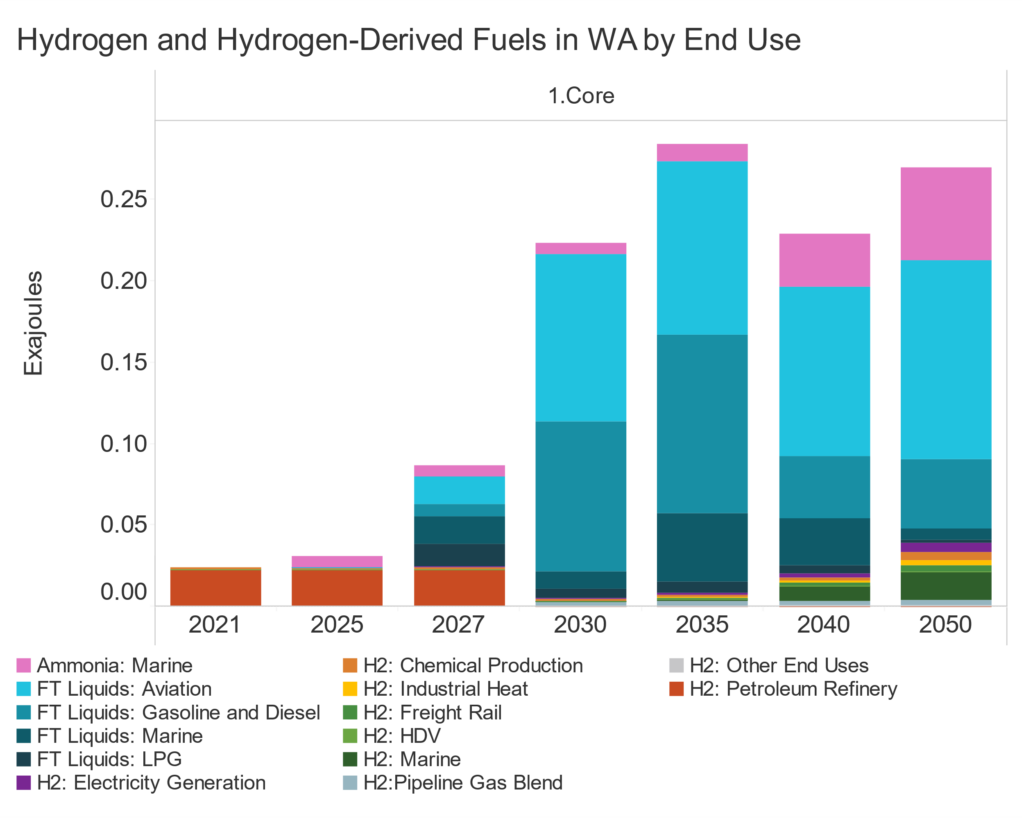New Legislative Report – Green Electrolytic Hydrogen and Renewable Fuels Recommendations for Deployment in Washington
Hydrogen can play an important role in Washington’s economy as it transforms to eliminate use of fossil fuels for energy, but the state must prioritize it for the most strategic uses, ensure adequate supplies of clean electricity for hydrogen production, and focus on environmental justice considerations, according to a report released this week by the Washington Department of Commerce.
The Department of Commerce has published a new legislative report titled Green Electrolytic Hydrogen and Renewable Fuels: Recommendations for Deployment in Washington. As directed in RCW 43.330.570, the report assesses opportunities and challenges to advancing green electrolytic hydrogen and hydrogen-derived fuels in Washington, and provides detailed modeling of anticipated demand for green hydrogen as part of Washington’s path to a net-zero economy. The report also provides analysis about electricity system impacts of hydrogen and renewable fuels deployment, siting and permitting recommendations, and workforce and environmental justice considerations. The report includes near term recommendations for the 2024 legislative session, as well as establishing the groundwork for longer-term planning about policy and funding recommendations that will help advance a systematic and equitable deployment of green hydrogen in Washington for 2025 and beyond. Recommendations included in the report were specifically designed to address the unique challenges and leverage key opportunities in Washington to develop a green electrolytic hydrogen market in line with the goals and objectives of the Clean Energy Transformation Act, the Washington State Energy Strategy, and the Healthy Environment for All (HEAL) Act. The report also reflects on recent announcements about the Pacific Northwest Hydrogen Hub being selected for award negotiations, and potential impacts of the final 45V Production Tax Credit.
Key findings from the report include:
- Washington will have strong demand for green electrolytic hydrogen and renewable fuels as part of a net zero economy. State demand will reach 0.224 exajoules (EJ) of hydrogen and derived fuels by 2030, and 0.27 EJ by 2050. Our policy and energy context provide mean Washington is one of the best opportunities to scale green hydrogen deployment in the country.
- Washington will need to scale up production of green hydrogen through electrolysis rapidly. The current baseline for in-state green electrolytic hydrogen production via electrolysis in Washington is near zero. This report anticipates that Washington will install 0.8 gigawatts (GW) of electrolysis capacity and produce 200,000 metric tons (MT) per year of hydrogen by 2030, and 4.5 GW of electrolysis and 700,000 MT per year of hydrogen by 2035.
- Renewable liquid fuels and green ammonia will also require significant electricity capacity to produce.
- Hydrogen and renewable fuels production must be developed in coordination with expanded renewable electricity capacity. Washington cannot meet the levels of hydrogen and renewable fuel production envisioned in this report without new transmission and generation capacity.
- It is critical to expedite and improve siting and permitting processes for green hydrogen projects, as well as for the siting and permitting of new renewables to support a hydrogen economy and economy-wide decarbonization.
- Green hydrogen and renewable fuels should be used strategically for end uses where they are well-positioned to support efficient decarbonization. This will include transitioning from fossil-derived hydrogen used in petroleum refining and chemical production, heavy-duty transportation sectors including aviation, maritime, and long-distance trucking, industrial heat and others as outlined in the modeling.
- Importing hydrogen and renewable fuels from other states may develop as part of a cost-effective approach to accessing adequate levels of green hydrogen and renewable fuels.
- Federal policy and funding decisions can significantly impact Washington’s hydrogen economy.
- The recent DOE announcement that the Pacific Northwest Hydrogen Hub is expected to be funded through the H2Hubs program will support Washington’s deployment of green hydrogen and renewable fuels, and may lead to additional electrolysis taking place in Washington of approximately 190,000 MT per year by 2040.
- Other federal policies and incentives – particularly the IRA Production Tax Credit (PTC) – are critical to support Washington’s hydrogen and renewable fuels market. While the final details of the PTC matter, access to this credit is a significant driver of green hydrogen deployment in Washington.
- There are environmental justice concerns unique to hydrogen and renewable fuels across the supply chain, which are important for project developers, tribes, and stakeholders to understand and address. Advancing a green hydrogen economy provides a critical opportunity to create more equitable outcomes than in fossil fuel energy deployment, if we focus on inclusive practices and equitable distribution of benefits.
The report offers full context for these key findings, including: background on Washington’s legislative action on hydrogen and renewable fuels; a detailed overview of the assessment’s modeling methodology, “what if” scenarios, assumptions, and results; an examination of necessary phases of investments and actions to advance green hydrogen in Washington; electrolyzer and clean electricity siting and permitting considerations; energy justice, environmental justice, and equity considerations; and a full list of policy recommendations.
Report and Appendices
- Full report: Green Electrolytic Hydrogen and Renewable Fuels: Recommendations for Deployment in Washington (PDF)
- Executive Summary (PDF)
- Appendix A: Technical Report (PDF)
- Appendix B: Data Accompanying Report (Excel)
- Appendix C: Framework for Siting and Permitting (PDF)
- Appendix D: Interdisciplinary Justice-Centered Frameworks (PDF)
- Appendix E: Addressing Environmental and Energy Justice Considerations (PDF)
- Appendix F: Guiding Questions from Meaningful Energy Development Framework (PDF)

